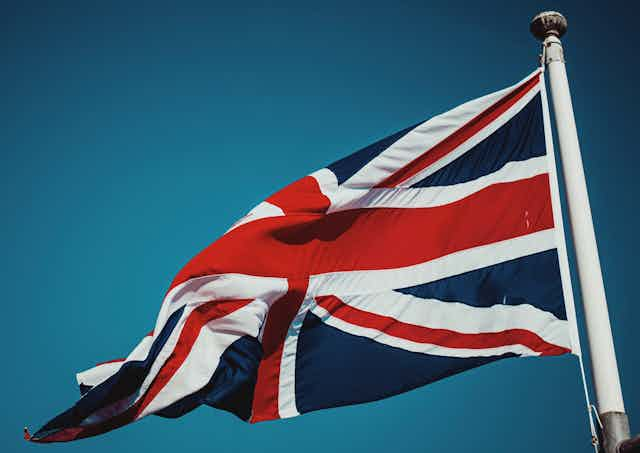The UK government has officially endorsed the celebration of June 25 as One Britain, One Nation (OBON) Day. Part of a campaign to promote British patriotism, the day is a long-standing endeavour that a few months ago barely anyone outside a group of schools in West Yorkshire had heard of. Yet it has since garnered celebrity support, been discussed in parliament and now gone viral.
The video for the OBON anthem, written by pupils and their music teacher at a primary school in Bradford, features children waving union flags and singing lyrics such as “Strong Britain, Great Nation”, and has been viewed over 3 million times.
This sudden flurry of interest was prompted by the education secretary, Gavin Williamson, praising the campaign. With such Whitehall enthusiasm, we would be forgiven for thinking the government itself had come up with this whole thing.
The actual history of OBON Day is more complex. But the government’s endorsement of the celebration is part of a wider, controversial drive to use schools to promote “British values”.
This is, in fact, the ninth year an annual One Britain One Nation Day has been celebrated. In 2005, former police inspector Kash Singh established OBON as a community-interest company. Singh came to the UK from the Punjab when he was six years old, unable to speak English.
He has explained that he wanted to see “everybody feeling part of this great country”. His project, he said, aimed to “utilise the strength of all our people to build a proud nation, where everyone has a strong sense of belonging and aspires to play an important role in the life of our nation”.
At Singh’s instigation, OBON Day celebrations have since taken place in Bradford and West Yorkshire. This year, the campaign caught the attention of notable MPs, including former cabinet member Esther McVey, who prompted Boris Johnson to support it at prime minister’s questions in May. An official endorsement followed, with a post on the department for education’s Twitter account encouraging schools to celebrate the day.
While certain MPs have echoed the Department for Education’s support of the project, others have criticised it for supposed nationalistic undertones. The song has been roundly mocked on social media. Memes have drawn a comparison with totalitarian regimes. Scottish first minister Nicola Sturgeon has said she thought the whole thing was a spoof.
The Welsh Football Association meanwhile has suggested Welsh pupils sing their nation’s anthem instead, Mae Hen Wlad Fy Nhadau. It’s a subtle dig at how the campaign fails to acknowledge devolution. It also neatly illustrates the heated debate the campaign prompts, around questions of patriotism and national identity, and what we teach our children.
It is striking that the government has couched its support for OBON Day within a push for what it has dubbed fundamental British values. In 2012, it introduced a requirement for schools to promote democracy, rule of law, individual liberty and mutual respect and tolerance.
Though ideas of respect and tolerance clearly have wide appeal, this legal duty for teachers has been controversial. Research has critically examined its motivations and links to the counter-terrorism Prevent strategy. Overall, the department for education’s encouragement of more schools to celebrate OBON Day can be seen as the latest in a series of moves over the past decade to promote values, virtues, morals and character education.
In my forthcoming book I trace these curriculum initiatives and related extra-curricular activities. The department for education’s focus on character-building programmes of sport, music and volunteering for schoolchildren has grown alongside a push to implement military ethos schemes and cadet units in schools. Seen in this context, Gavin Williamson’s support of OBON is hardly surprising.
Which great nation?
A recent poll found there are still deep divisions along the lines created by the Brexit referendum. In which case, you might ask if the sentiment of something like OBON Day could actually be restorative.
The problem is that the UK is not one nation, but a union of four: England, Wales, Scotland and Northern Ireland, the latter of which is not part of Great Britain. The fact that this celebration is being held on June 25 sidelines Scottish schools, many of which have already closed for the holidays by this date. Education is also a devolved issue, and the Welsh government highlighted that it had “not been engaged in this project”.
This incoherence in the campaign appears to have been overlooked by the government. And similar dynamics can be seen in other projects it has backed. The National Citizen Service, for example, is a state-funded youth volunteering scheme but which only operates in England and Northern Ireland. My research reveals how its name and brand overlooked devolution and how this ultimately hampered its potential for being implemented in other parts of the UK.
It is unclear how many children will take part in OBON activities. Indeed, it appears its reach is still largely limited to the schools in West Yorkshire who knew about it before the song went viral. Nevertheless, the department for education’s endorsement is significant. It demonstrates a continued drive from Westminster to promote fundamental British values in schools, at a time when education is increasingly embroiled in a wider culture war worthy of far greater attention.

